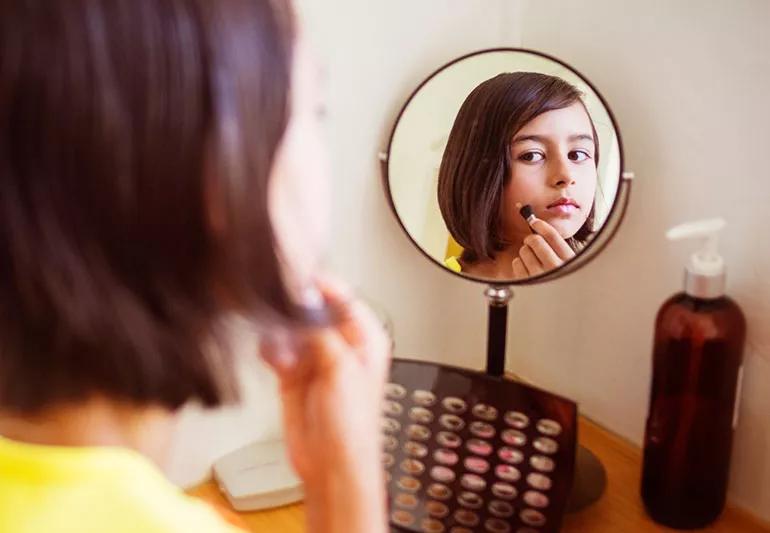Start by discussing healthy routines as well as healthy boundaries

“You’re beautiful just the way you are.”
Advertisement
Cleveland Clinic is a non-profit academic medical center. Advertising on our site helps support our mission. We do not endorse non-Cleveland Clinic products or services. Policy
A phrase we’ve all heard from our parents, and it’s always true of course! But right now, chances are your child is being exposed online, at their friends’ house or at school to endless products that promote beauty or other kinds of visual transformation.
And let’s face it, even a parent’s sincere compliment can’t always compete with the allure of the steady stream of marketers and influencers pushing gleaming lip-gloss, colorful characters and virtual perfection. (At least that 1980’s bright blue glitter eyeshadow trend is gone and more natural styles are in!)
While interest in makeup begins at a young age and tends to rise in middle school when kids engage in character-play and emulate older children and adults, parents may wonder what age is appropriate to allow their kids to wear makeup. Parents may also wonder how to keep kids safe and healthy once they do decide to allow it.
“The first rule of thumb is to have an open discussion about makeup as soon as your child expresses interest,” says pediatrician Eva Kubiczek-Love, MD. “As with any new activity as your kids grow, parents need to establish expectations, set limits and understand the psychological and health impact of these permissions on them.”
Advertisement
While there’s no right or wrong age, the proper way for your kids to wear makeup depends on your family’s perspective and the accepted practice in your child’s community. And making sure you’re okay with these norms ahead of time can help in your decision making. If children are involved in dance or cheer competitions for example, makeup may be more prevalent in their social circles.
“Also it’s always a good idea to ask your kids why they’re interested in makeup, encourage them to have fun, and expect that you may need to tell them when you think too much is too much,” Dr. Kubiczek-Love says.
Regardless of when you allow your kids to use beauty products and cosmetics for special occasions, play or for regular use, there are five tips that apply to any makeup wearer that are especially true for your child’s younger, developing skin.
According to Dr. Kubiczek-Love, parents should help their children:
“The most important things is to teach kids that makeup is meant to enhance their appearance, not change or overpower it,” Dr. Kubiczek-Love says.
Advertisement

Sign up for our Health Essentials emails for expert guidance on nutrition, fitness, sleep, skin care and more.
Learn more about our editorial process.
Advertisement

Although it could be used as a moisturizer, this new trend is not recommended

It’s a great disinfectant for around your home, but not for your skin

Changes in texture, smell, color and performance are signs it’s time to throw the cosmetic item away

Strengthening your skin barrier, simple routines and minimizing products are ongoing, popular trends

Moisturizing, running a humidifier and adjusting your showers may help keep itchiness and irritation at bay

Glycolic acid benefits skin tone, texture and pigmentation by exfoliating dead skin

Some gentle soap and warm water go a long way when you’re washing these cosmetic tools regularly

New formulas are less drying and contain water-based and skin-loving ingredients

Even small moments of time outdoors can help reduce stress, boost mood and restore a sense of calm

A correct prescription helps your eyes see clearly — but as natural changes occur, you may need stronger or different eyeglasses

Both are medical emergencies, but they are very distinct events with different causes